What’s on my bookshelf: Challenge III Resources
The Classical Conversations Challenge III program is where the incredible fruits of the entire program just start to explode all around. With Shakespeare, poetry, and philosophy, this is one of my husband's favorite levels to tutor. This year looks into consequences of choices made in literature, American history, and so much more.
As with all of my resource book lists, these items are all optional. I'm also including some of my favorite extra adventures that we did with the class that really made this year special.
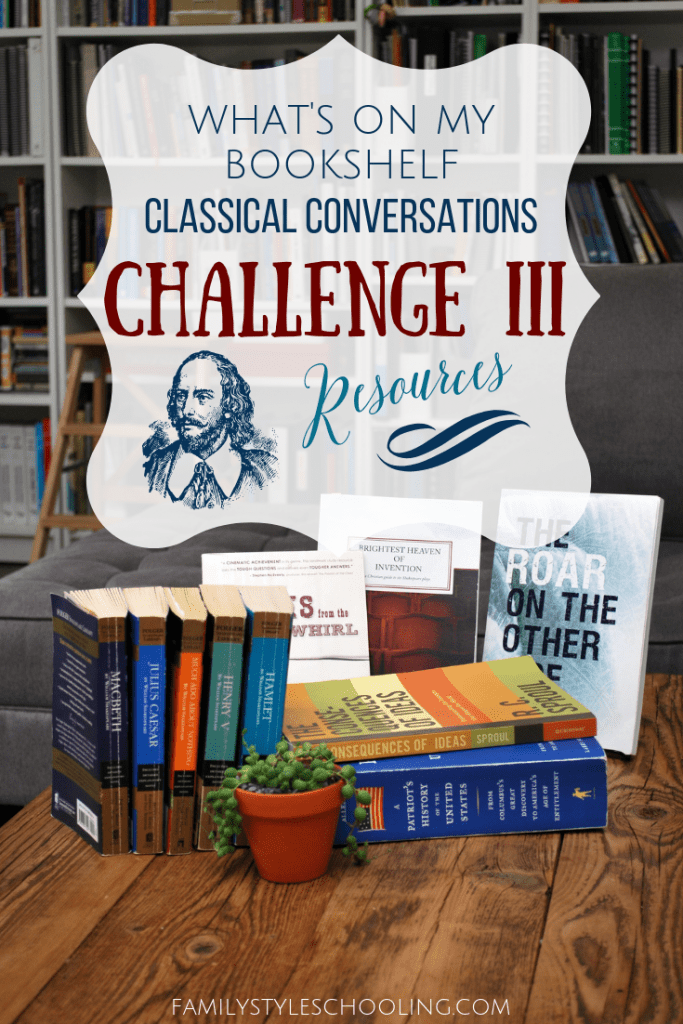
Exposition
Shakespeare
Challenge III shifts the literature reading from 18 books in Challenge II down to 5 Shakespeare plays. This allows students to really dig into the plays. They read together, discuss the stories, and memorize lines to present to the class.
My absolute favorite resource is Peter Leithart's book, Brightest Heaven of Invention. He walks readers through the plays and explains the structure of the work as well as spiritual themes that run through each one. This is a required reading for students, but for parents, it would be a great way to stay connected to the reading with your students and offer great conversation starters for discussing these big ideas further.
Shakespeare Movie Nights
One of our favorite things to do included hosting Shakespeare movie nights. I got the idea from The Pioneer Woman and we found it a fun way to build community while getting a better idea of what was happening in the plays!
Much Ado About Nothing is a really fun play to start with watching together. Watch out for about the first ten minutes though...the group is cleaning up to welcome the soldiers and there is a lot of joyful showering that is completely unnecessary! We used a science fair board to cover the screen until the scene passed.
Julius Caesar was a little difficult to follow, but what really helped was reading a summary before we watched it. This helped us track with the story line.
All of the boys loved Henry V and the battle scenes. Kenneth Branagh happens to be very involved in bringing Shakespeare to life, so it's funny to see him again as a different character.
We did not watch Macbeth together. There aren't any versions of that movie that aren't rated R. We did watch an animated version that was pretty creepy. This animated cliffs notes will give you an idea of why that might be the case.
Fun with Hamlet
At the end of the year, students are given the option to stage a mock trial for Hamlet. They get to put him on trial to argue whether he was crazy or a murderer.
We also didn't watch Hamlet for a couple of reasons. The first was that the Kenneth Branagh version of the movie, which is excellent for the most part, has a flashback of Hamlet and Ophelia's romantic relationship that would not be presented in a stage play. Without that visual imagery, this movie is incredible. Maybe if you had a clear play DVD player...but we opted out.
The other reason that we didn't watch the movie was that my son's class decided that instead of doing the mock trial, they'd create a dramatic presentation of Hamlet for our community. By not watching the movie, this gave them dramatic license to creatively express the story in their own way.
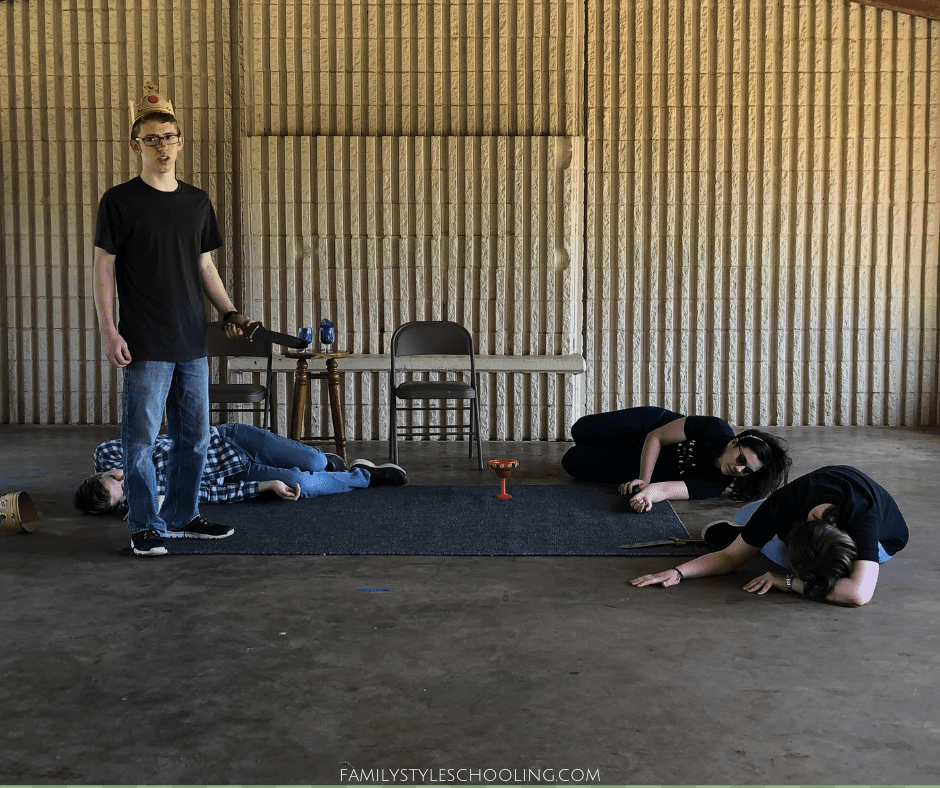
This was the highlight for the class this year, and such a great way for them to work together on a project.
Other Shakespeare Books on My Shelf
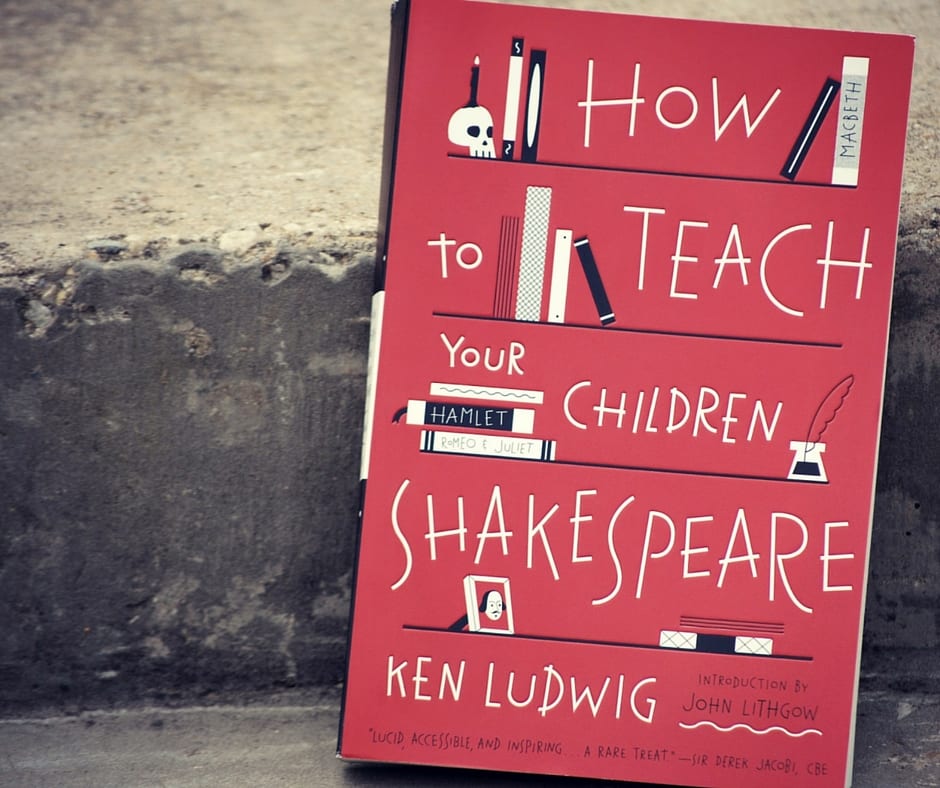
Ken Ludwig's How to Teach Your Children Shakespeare has been one of my favorites even though I've never read it all the way through. It brings out the beauty of the language in an approachable way.
I also love any any of the DK reference books. They do a great job of summarizing information and giving students a great resource for researching more.
These little Shakespeare children's story books are a fun way to get a basic idea of what will be happening in the play. We always start here.
Then we read the Charles and Mary Lamb version of the play to get another layer of familiarity with the characters before we dive into the full Shakespearean language.
Poetry
The other element of exposition in Challenge III that really enhances their writing is the poetry emphasis. Students work through Roar on the Other Side: A Guide for Student Poets and write poetry throughout the year.
At the end of the year they can put together a poetry anthology, or a formal physical presentation of their poetry. My son used Blurb to put his together and it was a beautiful keepsake for his work.
Debate
While the reading volume goes down in the literature department, it increases in the history department, but this is a great shift.
American History
To give you a little bit of perspective on the depth of A Patriot's History of the United States, the Audible form of the book has a running time of 55 hours and 43 minutes. Pause for a minute and take that in. While it is a lot of reading, it is a really great read.
We enjoyed listening to The Intellectual Devotional: American History during morning time with the family when my oldest was working through this study.
One of my favorite American History resources is The Landmark History of the American People by Daniel Boorstin. He writes in a very interesting way and helps add perspective to the topic that can be great for enhancing conversations.
Throughout the semester, students write papers and present speeches on the topics they're reading. I loved having Joy Hakim's series on my shelf for researching purposes. I've found this whole set used over the years, so I didn't pay the full price of a new set.
Study Tips
One thing that my son did that really helped him keep the stories straight was to create an "important events" journal. For each chapter in the book he picked two or three major events to summarize. This worked well for preparing for speeches that he had to give as well as just helping him process the material he was reading.
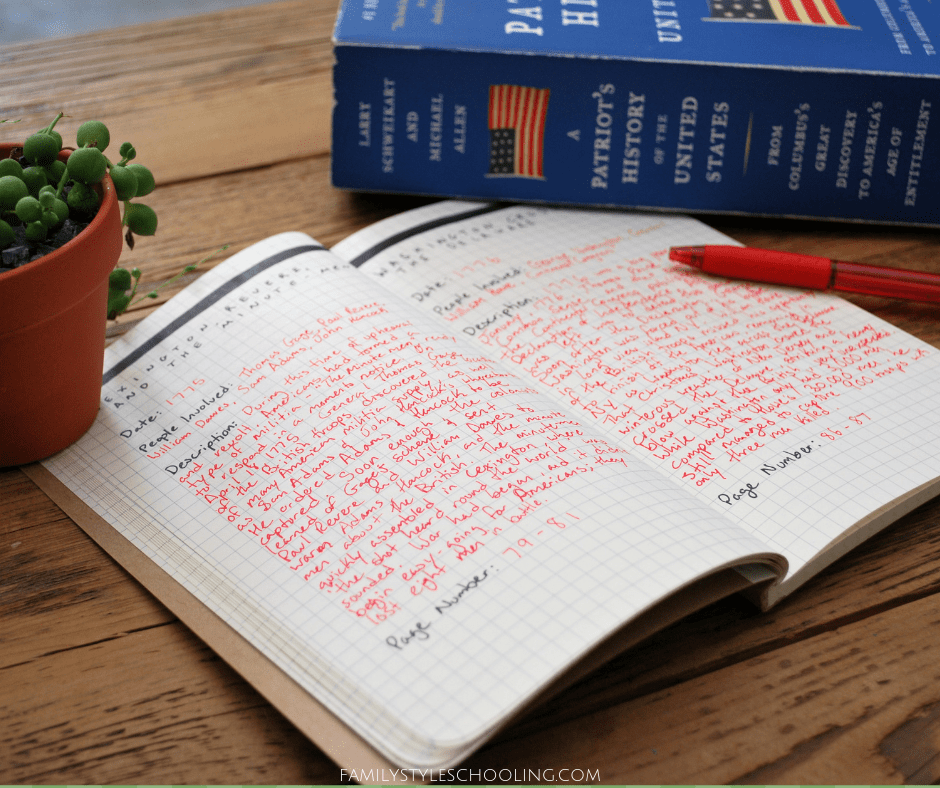
Lincoln-Douglass and Team Policy Debate
The skills of formal debate are continued to be practiced and cultivated in Challenge III through a Lincoln-Douglass debate in the Fall like Civil disobedience in a democracy is morally justified, and a Team Policy debate in the Spring like The United States federal government should substantially curtail its domestic surveillance.
My absolute favorite resource for debate is the Debate Trivium Table. This gives students the order of each of the debates, tips on the importance of each section of the debate, and explains the stock issues that will help them win their arguments.
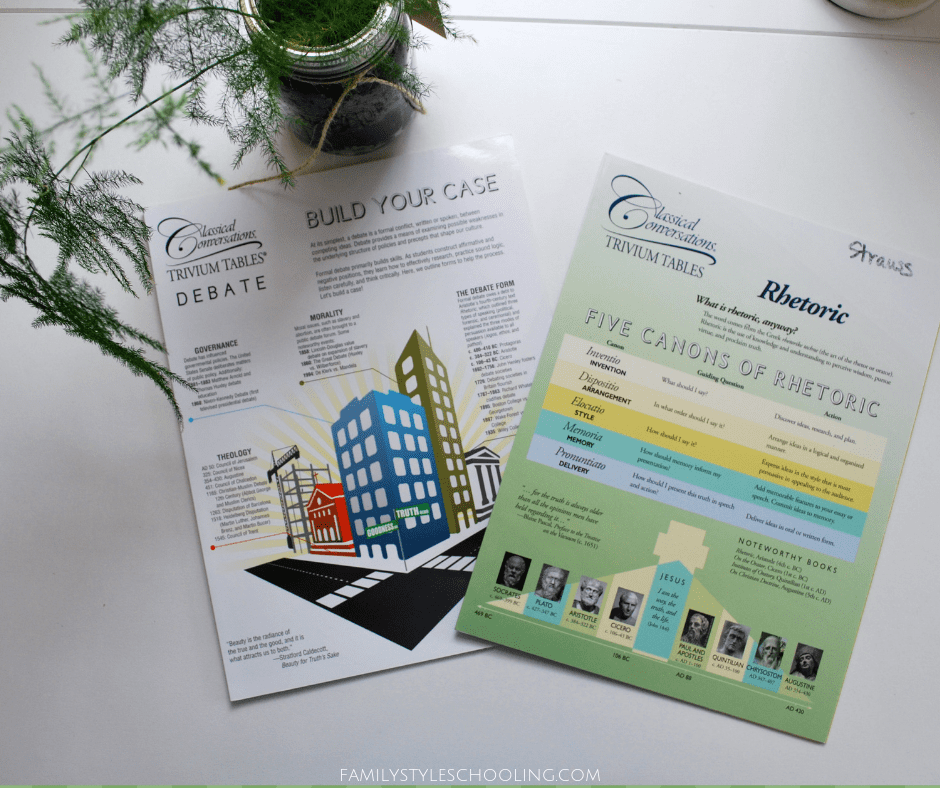
I also love the Rhetoric Trivium Table as they move into more presentations. This helps them work through the five canons of Rhetoric to make their presentations memorable.
Chemistry
The Chemistry study in Challenge III looks at consequences from a scientific perspective. Every week students are working through labs in class and discussing their results.
Although some of the labs were extremely short, if students had read the module and come with their lab books ready for the experiment, the conversations were greatly enhanced. Looking at the cause and effect patterns in the labs will only be understood when the at home assignments were completed.
Periodic Table Helps
One really helpful tool is knowing and understanding how the periodic table flows. Some great books on my shelf include:
Math in Chemistry
Stoichiometry is the math that will make or break your Chemistry study this year. Students must attend to the language of this math in order to find success in Chemistry. Kahn Academy has a great Stoichiometry series that students can watch to help them through their studies.
Here are some other online resources that you might seek out for help in this department:
Chem4Kids - Reactions: Stoichiometry
Stoichiometry and Balancing Reactions
How do you solve a stoichiometry problem?
Reasoning
This is always one of the students' favorite seminars.
Philosophy
The first semester centers around The Consequences of Ideas by R.C Sproul. There is a whole video series that corresponds with this book that is fantastic. You can access it here, on RightNow Media, or you can get the DVD free here!
Students walk through the beliefs of different philosophers over the years.
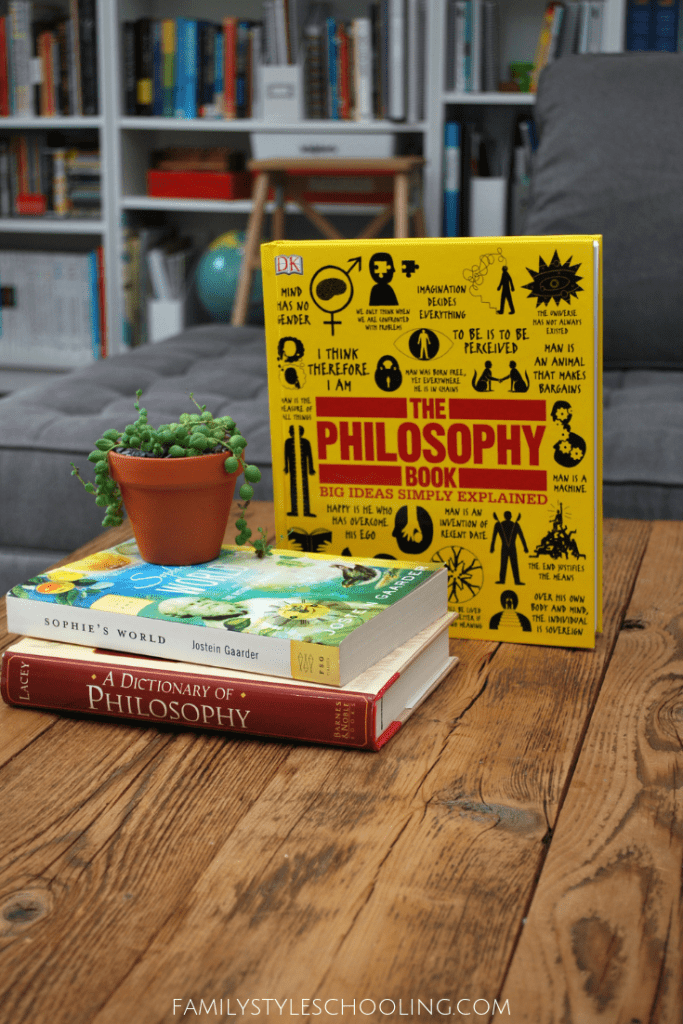
As always, I like to have additional resources at home to have another point of reference if a certain philosopher is confusing.
One of the books that used to be in the Challenge I curriculum is Sophie's World. This is a fun introduction to philosophy as it is told in story form. This would be a great summer read in preparation for the semester's studies.
I've also collected a few dictionaries of philosophy from used book sales to keep on the shelf. There isn't a specific one that I just love, but I really like having multiple resources especially in something like philosophy.
Logic & Socratic Dialogues
In the second semester, students take on Advanced Formal Logic and begin to apply the skills they've been learning to actual writings. One of the challenges they face is finding good articles that express the types of syllogisms they're studying. Here are some great options:
They'll also be digging into Plato's Meno which asks the question: what is virtue and can it be taught. The students write a paper on this topic, which ended up being my husband's favorite all time paper from any of his challenge tutoring days. He also put their papers together into an anthology with Blurb to give to them as a gift.
Latin
In Challenge III, students finish up Henle's Second Year Latin book in the first semester and move on to Henle's Third Year Latin book in the Spring. They finish up translating Caesar and then move on to translating Cicero.
The vocabulary can be a little more challenging because it moves away from the war terminology. The footnotes are very helpful for keeping up with the new vocabulary.
Also, don't forget how helpful the answer key can be. Since this is a speech, it is good to read how the answer key translates the arguments.
Math
If you're using Saxon, I think the biggest help is knowing how the pace you choose can relate to your student's high school transcript. First of all, it is good to note where you get that Geometry credit.
Since it's incorporated in with Algebra, you get ½ of the Geometry credit when you complete Algebra II, and the other half when you finish the first 60 lessons of Advanced Math. This also leads to a question about pace.
If you're wanting your student to take Calculus, you'll want to work to complete the Advanced Math book in their Challenge III year. If you're not that ambitious, you can slow down your math pace and take two years to complete the Advanced Math text book. This is what we chose.
Here are some more thoughts on Saxon Advanced Math on the Transcript that I found very helpful.
Challenge III
By the time most students reach Challenge III, they will be driving and have jobs. This will be the most challenging aspect of their year: how do they fit it all in. While the workload seems to decline a bit, their rhetorical assignments (think presentations) ramp up. It can be difficult to juggle it all.
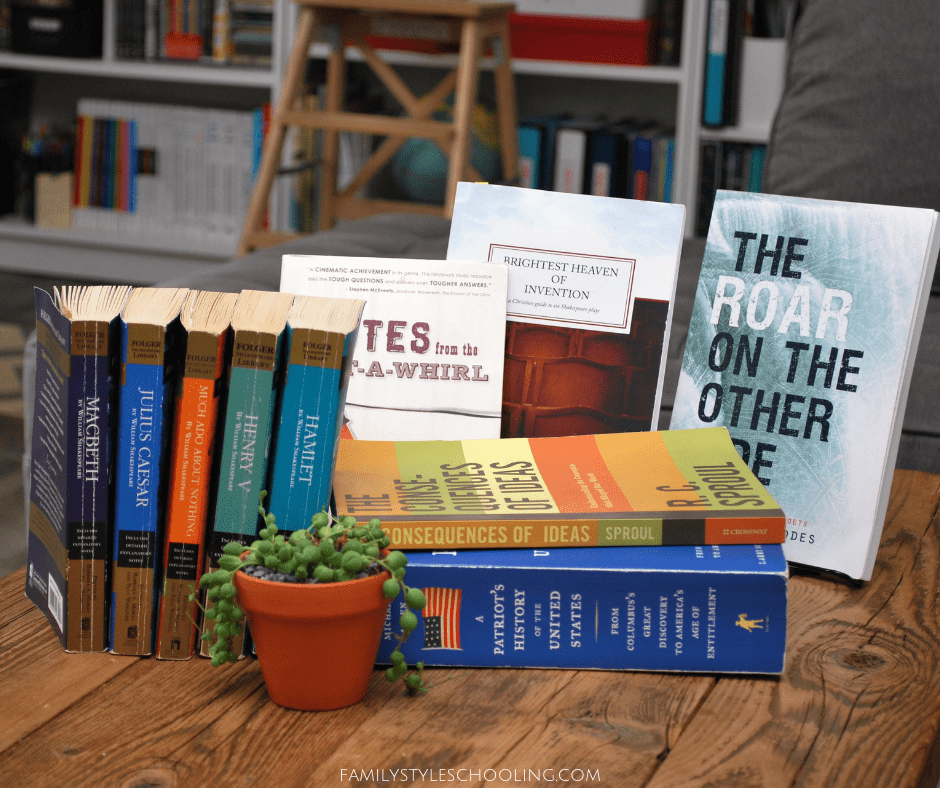
Always keep in mind that as the parent, you have a vision in mind for your student. Work together with your student and their tutor to make sure that the choices that you guys make together fall in line with that vision. Trust the process and enjoy the fruits of your laboring together.
Looking for resources from another level?
Betsy Strauss is an unexpected homeschooler, mother of three, who is in a relationship with a sweet man for life. She loves reading books, drinking coffee, and learning anything with her kids.

